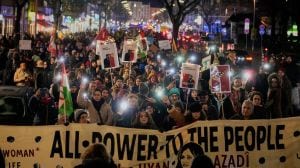Kabul question
The shadow of Afghanistan should fall on Pranab Mukherjee8217;s Pakistan visit

As External Affairs Minister Pranab Mukherjee heads for Islamabad this weekend for wide-ranging consultations with the Pakistani leadership, Afghanistan is not expected to figure on his agenda. But it should. Many would argue that Mukherjee8217;s brief is overloaded. His mission is to get a fix on the state of the fragile peace process between India and Pakistan, especially on the ongoing talks on Jammu and Kashmir. Mukherjee is also being asked to make a call on how soon Prime Minister Manmohan Singh should visit Pakistan, and pre-cook, if he can, the outcome of that visit. It will be tempting, therefore, for Mukherjee to sidestep the Afghan question.
We would like to remind Mukherjee that in the late 1970s, much like now, India had assumed that the relationship with Pakistan was on the mend. The Soviet intervention in Afghanistan at the end of 1979 fundamentally altered the global and regional context. It revived the Cold War confrontation between Washington and Moscow, redefined Pakistan as a 8216;frontline state8217; in the American calculus, generated a new arms race between India and Pakistan, helped Pakistan build nuclear weapons, and radicalised Subcontinental Islam. The resurgence of the Taliban today and the real possibility that the US and NATO might cut and run from Afghanistan underline the potentially devastating future consequences Indo-Pak relations.
Instead of setting up a false contradiction between India8217;s enduring interests in Afghanistan and the new opportunities for peace with Pakistan, Mukherjee must seek to engage General Musharraf on the prospects for triangular cooperation between New Delhi, Islamabad and Kabul to defeat the extremist forces that threaten all the three countries. Given the rapidly sinking Pakistan-Afghan relations and Islamabad8217;s deep aversion to an Indian role in Afghanistan, that could be a tall order. India, however, cannot afford to choose between Afghanistan8217;s President Hamid Karzai and Pakistan8217;s General Musharraf. Traditionalists would respond with a sophisticated calibration between New Delhi8217;s policies towards Kabul and Islamabad. A bolder Indian approach would recognise the geographic and demographic intimacy between Pakistan and Afghanistan, and encourage both to cooperate. The huge benefits from triangular cooperation were probably on Dr Singh8217;s mind when he mused the other day about having breakfast in Amritsar, lunch in Lahore and dinner in Kabul. It is a vision that is surely worth pursuing.
- 01
- 02
- 03
- 04
- 05






























